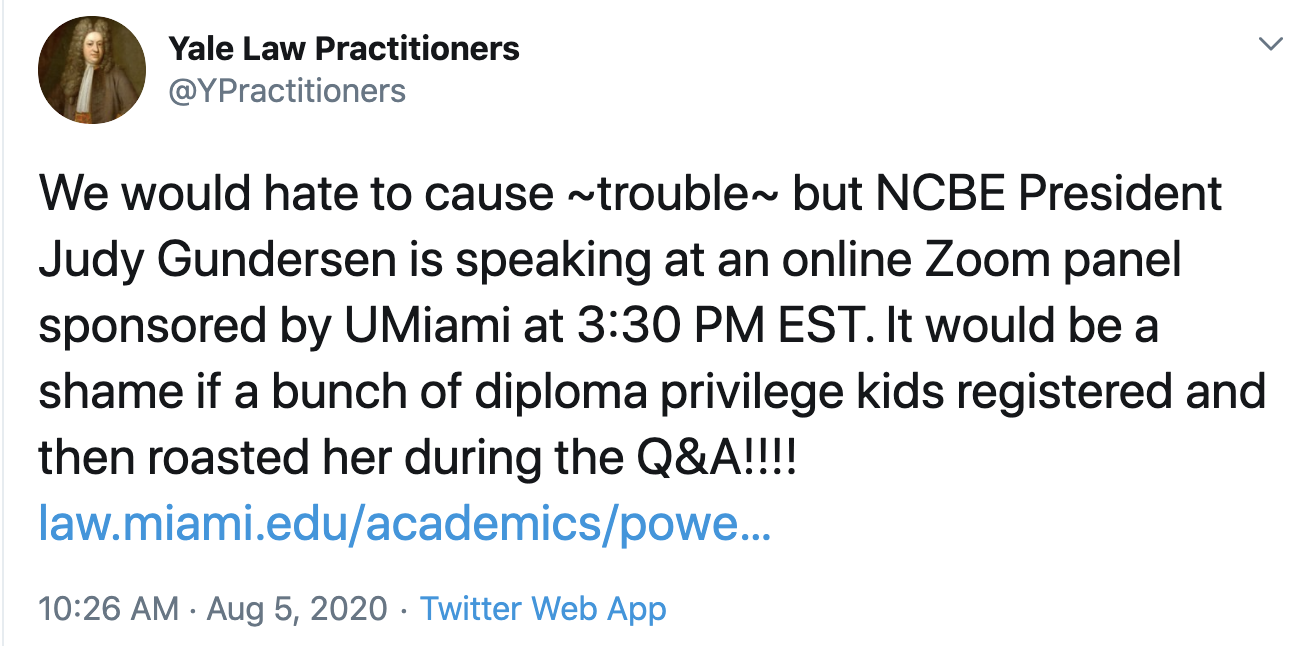NCBE Prez Issues Threat To Tie Up Licenses Of Bar Exam Critics
There's definitely a Character & Fitness to practice problem here, but it belongs to the NCBE, not the applicants.
 Did the president of the NCBE really threaten to keep bar exam critics from getting licenses? Well, it depends. If you’re the sort of person who thinks a mobster saying “nice little shop you have here, it’d be a shame if something happened to it” is just expressing well wishes on your business endeavors, then no. But if you’re one of the people residing in a reality-based society, then she absolutely did.
Did the president of the NCBE really threaten to keep bar exam critics from getting licenses? Well, it depends. If you’re the sort of person who thinks a mobster saying “nice little shop you have here, it’d be a shame if something happened to it” is just expressing well wishes on your business endeavors, then no. But if you’re one of the people residing in a reality-based society, then she absolutely did.
NCBE honcho Judith Gundersen appeared on a panel at Miami Law’s “Power, Privilege, and Transformation: Lessons from the Pandemic for Online Legal Education” virtual conference yesterday. With the July in-person bar exams that Gundersen continues to demand marred by lapses in safety protocols and involving at least one positive COVID case, Gundersen took the opportunity in this serious forum to threaten the people raising public health concerns.
During the event, Gundersen said that she and other NCBE officials:

Data Privacy And Security With Gen AI Models
have been the subject of extreme lack of civility and professionalism and in some cases, conduct that borders on harassment. Character and fitness issues are arising in the way examinees are communicating with Board Staff and Board volunteers.
Harassing people is bad! But if you’re giving this quote its most superficial read, then we may have some bridges to sell you.
We’re talking about a lawyer here (and she’s no less a lawyer just because she never took a bar exam!), so we need to parse these words carefully. Gundersen does not say that anyone has been harassed, quick to say it “borders on” harassment which is the “I can see Russia from my house” of harassment allegations. Nor does she say that she’s actually referred any violations to a Character & Fitness panel, opting instead to vaguely raise the prospect that anyone who chooses to engage with the NCBE just might fall into that category and have their license tied up. So your best bet, she’s conveying, is to not speak out at all.
Lest you think I’m downplaying the seriousness of the risk of harassment, Gundersen included this example of the foul treatment out there.
Sponsored

Tackling Deposition Anxiety: How AI Is Changing The Way Lawyers Do Depositions

How Thomson Reuters Supercharged CoCounsel With Gen AI Advances


Curbing Client And Talent Loss With Productivity Tech

How Thomson Reuters Supercharged CoCounsel With Gen AI Advances


With all the time in the world to pick an example this was the “bad” one she came up with. Joining a panel to ask her challenging questions. FIRE UP THE DISCIPLINARY COMPLAINTS!!! But seriously, choosing to quote this tweet as an example of what she sees as bordering on harassment sends a pretty clear message to diploma privilege advocates: pretty much everything is potentially a C&F issue in our eyes.
This is a threat designed to chill speech. It’s so textbook it could feature in an issue-spotter if the NCBE were a government actor. Though with the sway the NCBE holds over state governments, it’s pretty close when it’s issuing warnings about using the state regulatory process to penalize its critics. A threat made worse when you consider that in many jurisdictions the NCBE is directly involved in the C&F process by preparing reports for the committees. It’s certainly closer to bordering on a state actor than NCBE critics are bordering on harassment.
Professor Brian Frye characterizes Gundersen’s handling of the COVID crisis as a brand of “moral fascism” which is harsh but hard to deny. The consistent refusal to see criticism of in-person bar exams as anything but weakness, the fixation on creating enemy Others, and the willingness to use threats of state action to quell dissent are all hallmarks of a fractured outlook.
Again, harassment is bad, but being angry, confrontational, salty, sarcastic, brazen, or caustic is not necessarily harassment. Policing “civility” is a well-worn trick of people with nothing substantive to say. It’s an amorphous standard self-servingly defined by the supposed victim. For good measure, it’s usually falsely tied to the concept of ad hominem — the logical fallacy of substituting personal attacks on the messenger with substantive argument. The use and abuse of the concept of ad hominem needs to stop. Saying we need diploma privilege because the NCBE clubs baby seals is an ad hominem attack. Saying we need diploma privilege because the greedy jackholes at the NCBE are risking public health despite a lack of evidence that the exam protects the public… that’s just providing color.
Sponsored

Legal Contract Review in Under 10 Minutes? Here’s How

Data Privacy And Security With Gen AI Models
Making fun of the fact that the country’s primary mouthpiece against diploma privilege is a product of diploma privilege is the closest the discourse gets to an ad hominem attack and even that is entirely substantive because it directly challenges the credibility of many of her claims.
But maybe she’s got a point. After all, if she’d taken a bar exam maybe she’d have enough sense of basic professionalism not to have issued this threat at all.
 Joe Patrice is a senior editor at Above the Law and co-host of Thinking Like A Lawyer. Feel free to email any tips, questions, or comments. Follow him on Twitter if you’re interested in law, politics, and a healthy dose of college sports news. Joe also serves as a Managing Director at RPN Executive Search.
Joe Patrice is a senior editor at Above the Law and co-host of Thinking Like A Lawyer. Feel free to email any tips, questions, or comments. Follow him on Twitter if you’re interested in law, politics, and a healthy dose of college sports news. Joe also serves as a Managing Director at RPN Executive Search.







